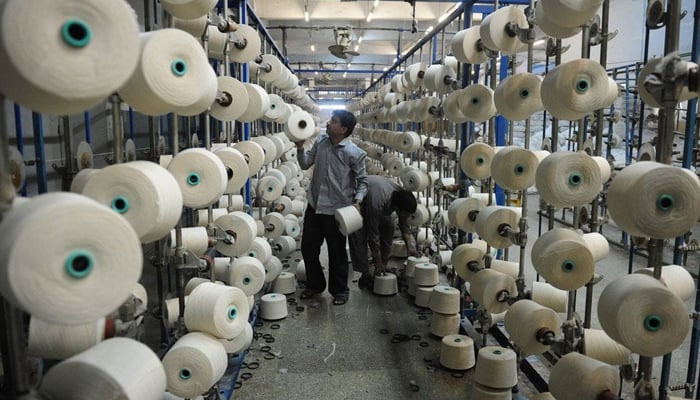APTMA slams 223pc increase in gas tariffs, seeks relief
KARACHI: The textile industry, which accounts for 60 percent of the country's exports, is facing a severe crisis due to a 223 percent hike in gas tariffs in the past year, an industry body said on Thursday.
The All Pakistan Textile Mills Association (APTMA) Southern Zone said in a statement that the recent increase in gas prices had made the export-oriented textile sector uncompetitive in the international market and forced many mills to shut down.
"The export oriented textile industry is dying fast and Pakistan is losing market share in the global marketplace due to the alarming rise in energy tariffs," said Zahid Mazhar, the central chairman of APTMA.
"Due to a 223 percent increase in gas tariff in one year, there was a capacity closure of 30 percent of firms in the textiles and apparel sector and the rest were at high risk of total closure over the coming weeks as they became uncompetitive in the international market as compared to the regional competitors like India, Bangladesh and Vietnam."
Mazhar said the export capacity of $600 million/month of textile industry had remained unutilized, mainly due to the high energy cost as the industry could not export inflation. The industry was being provided grid electricity at Rs52/kWh i.e. 18 cents/kWh, which was more than double of what the competing countries were charging from their industry.
In addition, the gas/RLNG rates for the textile sector were much higher i.e. over $12/MMBTU as compared to the regional competing countries like India at $6.5/MMBTU, Bangladesh at $7.5/MMBTU, and Vietnam at $9.80/MMBTU.
He said the overall hike in gas tariff was 263.85 percent as the industries of Sindh and Balochistan were forced to take RLNG instead of indigenous gas at the ratio of 40 percent of RLNG, due to which the cost of gas had risen from Rs852 per MMBTU till December 31, 2022 to Rs3100 per MMBTU, resultantly the cost of production had also increased tremendously which was beyond the limit of absorption by the industries of two provinces.
Mazhar further said that the industries of Sindh and Balochistan were asked to take RLNG instead of indigenous gas to run their mills even though the two provinces were producing about 85 percent of the natural gas produced in the country which was against the spirit of the Article 158 of the Constitution of Pakistan according to which “the Province in which a well-head of natural gas is situated shall have precedence over other parts of Pakistan in meeting the requirements from the well-head”.
APTMA demanded that the government reverse its decision of astronomical increase in gas tariff to make textile exports competitive in the international market which was being continuously eroded by a surge in energy prices during the last one year.
-
 Winter Olympics 2026: Lindsey Vonn’s Olympic Comeback Ends In Devastating Downhill Crash
Winter Olympics 2026: Lindsey Vonn’s Olympic Comeback Ends In Devastating Downhill Crash -
 Adrien Brody Opens Up About His Football Fandom Amid '2026 Super Bowl'
Adrien Brody Opens Up About His Football Fandom Amid '2026 Super Bowl' -
 Barbra Streisand's Obsession With Cloning Revealed
Barbra Streisand's Obsession With Cloning Revealed -
 What Did Olivia Colman Tell Her Husband About Her Gender?
What Did Olivia Colman Tell Her Husband About Her Gender? -
 'We Were Deceived': Noam Chomsky's Wife Regrets Epstein Association
'We Were Deceived': Noam Chomsky's Wife Regrets Epstein Association -
 Patriots' WAGs Slam Cardi B Amid Plans For Super Bowl Party: She Is 'attention-seeker'
Patriots' WAGs Slam Cardi B Amid Plans For Super Bowl Party: She Is 'attention-seeker' -
 Martha Stewart On Surviving Rigorous Times Amid Upcoming Memoir Release
Martha Stewart On Surviving Rigorous Times Amid Upcoming Memoir Release -
 Prince Harry Seen As Crucial To Monarchy’s Future Amid Andrew, Fergie Scandal
Prince Harry Seen As Crucial To Monarchy’s Future Amid Andrew, Fergie Scandal -
 Chris Robinson Spills The Beans On His, Kate Hudson's Son's Career Ambitions
Chris Robinson Spills The Beans On His, Kate Hudson's Son's Career Ambitions -
 18-month Old On Life-saving Medication Returned To ICE Detention
18-month Old On Life-saving Medication Returned To ICE Detention -
 Major Hollywood Stars Descend On 2026 Super Bowl's Exclusive Party
Major Hollywood Stars Descend On 2026 Super Bowl's Exclusive Party -
 Cardi B Says THIS About Bad Bunny's Grammy Statement
Cardi B Says THIS About Bad Bunny's Grammy Statement -
 Sarah Ferguson's Silence A 'weakness Or Strategy'
Sarah Ferguson's Silence A 'weakness Or Strategy' -
 Garrett Morris Raves About His '2 Broke Girls' Co-star Jennifer Coolidge
Garrett Morris Raves About His '2 Broke Girls' Co-star Jennifer Coolidge -
 Winter Olympics 2026: When & Where To Watch The Iconic Ice Dance ?
Winter Olympics 2026: When & Where To Watch The Iconic Ice Dance ? -
 Melissa Joan Hart Reflects On Social Challenges As A Child Actor
Melissa Joan Hart Reflects On Social Challenges As A Child Actor




